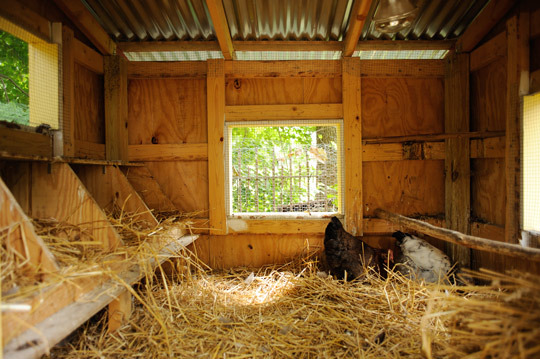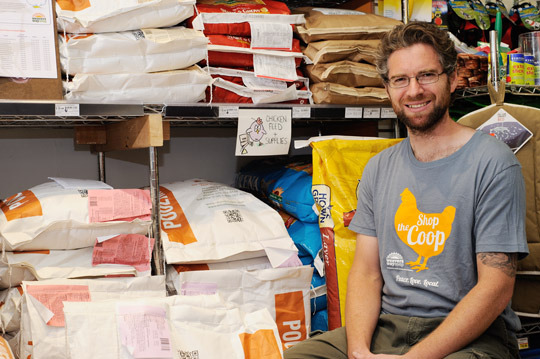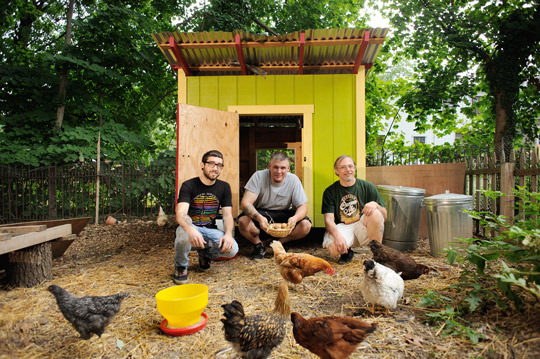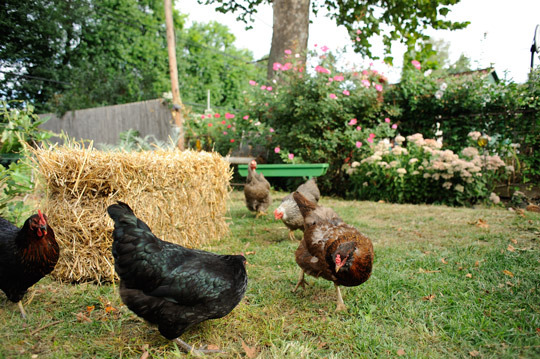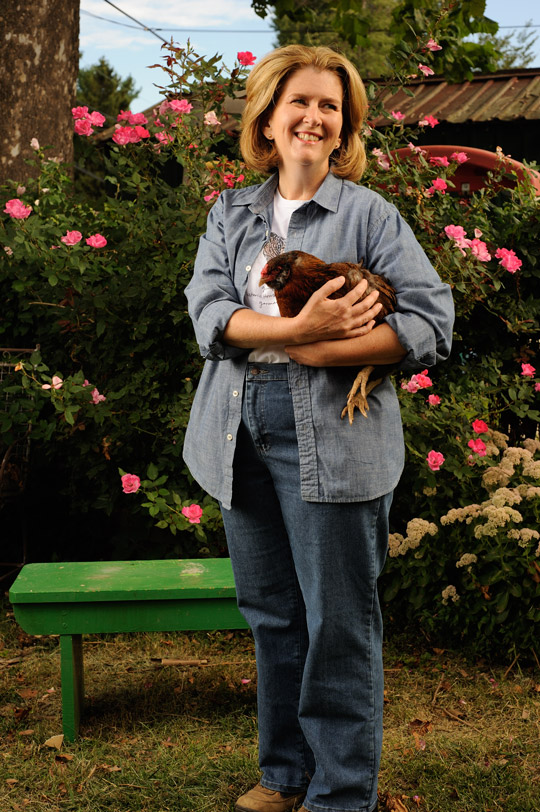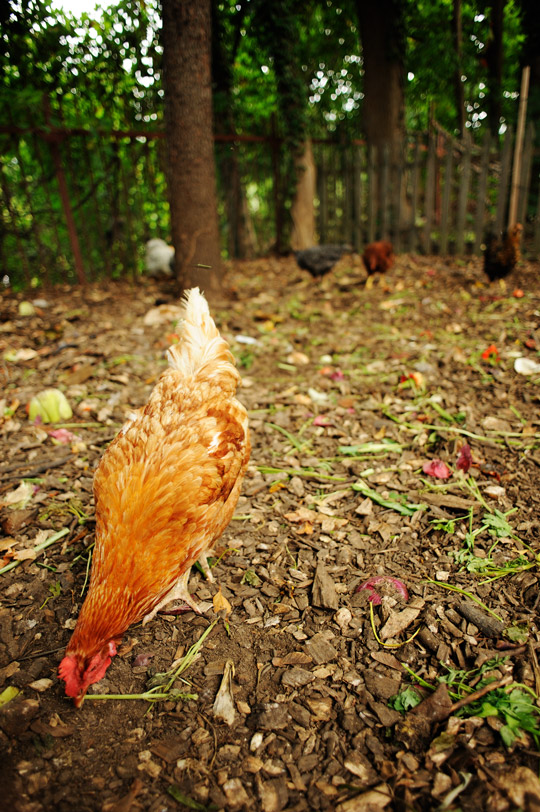by Sara Schwartz
Backyard chickens have been illegal in Philadelphia since 2004. It’s time for that to change.
Bailey Hale and his (now) husband Thomas McCurdy, a pastry chef, were happily tending to their flock of hens and chicks in South Philadelphia, an area they had lived in for 10 years. They owned their house and the lot next door where they kept a large garden, chickens and bees. “We could almost see City Hall from the bedroom, we were that close to downtown,” Hale says. “We were doing fine with it for quite a while.” But then, in 2011, a knock came at the door.
“It was someone claiming to be animal control saying he was there to take the chickens, and he had also called the news,” he says. “For a while, you could find the news coverage of our ‘big chicken raid.’ ” Hale says he thinks they were hoping to uncover a cock fighting ring, but when he emerged with “a couple dozen beautifully colored eggs … that took a little bit of thunder out of their news story.”
Hale isn’t sure whether the inquiry began with the City or if a disgruntled neighbor alerted the authorities, but he never received any further notification or even a fine. They were subsequently left alone, but Hale and McCurdy were spooked enough by the incident and the threat of further action that they no longer felt comfortable in Philadelphia.
“[T]hat definitely started the discussion of moving somewhere we could have a local farm, or at least not have the pressure of doing it illegally,” Hale says. He and McCurdy started looking at Bucks County, but couldn’t find “suitable places” within an hour of Philadelphia that were affordable.
After renting a few farms up the East Coast, Hale and McCurdy eventually purchased a farm in Irasburg, Vermont and named it Ardelia Farm & Co., in honor of Hale’s grandma. The farm’s website, Instagram and Facebook pages document what appears to be a bucolic setting and a thriving business. They sell baked goods, meat, eggs and cut flowers at two local farmers markets; and also sell mail-order heritage-breed baby chicks, turkeys, guinea fowl and eggs for hatching. And this Thanksgiving, Hale and McCurdy will deliver heritage turkeys to Philadelphia. “But yeah, it all kind of started because we got kicked out of Philadelphia,” Hale says, laughing. “So, I can’t say it’s been a bad thing. We’re happy with the course of events, but really the thing that got us looking to live somewhere else was the whole chicken debacle.” [>]
Keeping chickens in Philadelphia became illegal in mid-2004 a few months after Northeast Philadelphia Councilman Brian O’Neill introduced Ordinance 040566, which amended the city code to add chickens to the list of city-banned farm animals. This now includes: chickens, geese, ducks, turkeys, goats, sheep, pigs and cows, “provided such other farm animal presents a public nuisance due to smell and/or noise.” The ordinance passed July 1, 2004. Since then, the only way a Philadelphian can legally have backyard chickens is to either own three acres of land, or run a nonprofit, educational institution, zoo or shelter.
Despite the illegality of backyard chickens, ownership is apparently on the rise. Anton Goldschneider, who manages the pet supply section at Weavers Way Co-op in Mt. Airy, says he’s noticed a significant uptick in chicken feed sales. In 2010, when the co-op started selling organic chicken feed (which costs about twice as much as conventional feed), they were averaging selling twenty 50-lb bags a month. Now they average 17 a week. Doing some napkin math, that means they are selling enough food to feed 600 chickens each month.
So, what is it about chickens that are compelling otherwise law-abiding citizens to willfully break the law?
Birds of a feather
After every workday, Maureen Breen pulls into the driveway of her Northeast Philadelphia home. As she emerges from her car, she hears her six hens clucking excitedly. Breen walks to her backyard over to a wire enclosure the size of a small shed and opens the gate. Out they strut, bobbing their heads and pecking at the ground, eating bugs. In the mornings, she gathers the eggs they lay, sometimes giving extras away to neighbors. One recent afternoon, she smiles as the hens wander around her fenced-in yard. “This is what I love to do. I sit in my yard and watch my chickens run around,” she says. It’s obvious the hens are well cared for. There is no scent indicative of an uncared animal, and aside from a low clucking, all is quiet.
Maureen Breen offers educational workshops at Primex Garden Center and Weavers Way Co-op on how to care for backyard chickens. | Photos by Albert YeeIn addition to her full-time job as an accountant, Breen offers educational workshops at Primex Garden Center and Weavers Way Co-op on how to care for backyard chickens. She’s also one of the administrators for the Facebook group Philadelphia Backyard Chickens, which at press time had 369 members (including myself), and has seen an increase in numbers over the years, though many don’t join out of fear it will give Animal Care and Control (ACCT) an easy target.
Breen doesn’t own three acres of land, but because of the workshops she conducts, she tried to make her ownership legal by forming a educational institution. She filed for a Federal Employer Identification Number and city business license number, and worked with Amy Laura Cahn, a staff attorney at Garden Justice League Initiative, to register with the city. But Breen says the city was unclear as to what “educational institution” exactly means, and although she and Cahn reached out to the Department of Health, Animal Control and Licensing and Inspections, no one could give a clear answer on the protocol. “There’s no official known process,” Cahn writes in an email.
Breen was offered pro bono legal services from some organizations to push forward, but she had a better idea: “I said that’s really silly [to expend so much legal effort] for one person; why don’t we make the effort and talk to city council?” And she’s done just that, using her connections and the Philadelphia Backyard Chickens Facebook group to mobilize chicken-owners into voicing their demand to legalize chickens again.
It’s patriotic to have chickens
Although the companionship of the chickens is itself a reward, Breen became interested in keeping hens in her backyard four years ago because of her passion for local food. This summer, her backyard, which is about 30 feet wide by 40 feet long, boasted a bountiful garden with celery, zucchini and tomatoes.
Breen was inspired by a mandate from the federal government during World War II. All patriotic Americans were urged to grow 40 percent of their own food, and that included raising backyard chickens for their eggs. Posters from that time boldly instructed people to “Save kitchen scraps to feed hens,” and urged that, “Even the smallest yard has room for a flock large enough to supply the house with eggs.” According to the United Egg Producers’ 2010 Animal Husbandry Guidelines, as recently as the 1940s, “small backyard flocks of chickens made up the majority of the egg-producing industry.”
These days, the federal government is battling childhood obesity, and their efforts have been focused on consumption, specifically at school lunches. An argument can be made that through raising hens, we can become reacquainted with an integral part of our food system and become more mindful eaters.
And the other positives of owning backyard chickens are plentiful. Like any other pet, chickens can provide an opportunity to teach children the responsibility of caring for an animal, and chickens require much less attention than a dog. Having fresh, organic eggs to give away to neighbors promotes a sense of community in a neighborhood. Chickens provide chemical-free pest control and their droppings create all-natural fertilizer. In addition, chickens will eat your food scraps, which means less waste to be hauled away; and if you aren’t composting, a reduction of greenhouse gases produced by the landfill.
The arguments against
Opponents of backyard chickens often cite noise, odor, attraction of predators and health issues as reasons for keeping the ban on urban chickens.
How noisy are chickens? According to a 2005 report on backyard chickens done by the city of Pleasanton, California, hens make less noise than a dog, except for their egg-laying squawking, which lasts for a few minutes and has the decibel level of 63 when standing two feet away from the hen—the same decibel level as two people talking. When testing the noise from nine feet away, it couldn’t be detected.
Odor, as with any domesticated animal, is the responsibility of the owner. Keeping the coop clean and full of hay greatly reduces odor. When it comes to predators, having trees overhead and adequate fencing are enough of a deterrent.
The risk of salmonella is a legitimate health issue, especially for people who are very young or very old, or those who have compromised immune systems. Chicken owners should buy their chicks from reputable sources and wash their hands thoroughly after handling an animal. Many opponents of urban chickens cite avian influenza, or bird flu, as a concern, but the risk to backyard flocks—or to the people who tend to them—of contracting bird flu is extremely low. In fact, no one has ever contracted bird flu in North America.
Unique models
In the spacious yard of his apartment in an historic home in East Germantown, Apollo Heidelmark, who works in the meat and fish department at Weavers Way Co-op, tends to seven hens. He’s been a tenant of the apartment home owned by Weavers Way Co-op general manager Glenn Bergman for seven years, and has managed the chicken coop at the apartment for about a year. The spacious fenced-in area has a bench that the hens perch on; a small triangle-shaped, chicken wire tractor coop that can be moved around; and a larger, light green wooden coop built by a former tenant that looks like it belongs on the cover of a glossy backyard chickens magazine. The big trees in the yard provide plentiful shade and protection from flying predators. These chickens seem to have a pretty great life.
“They eat a lot of scraps. I bring home a five-pound bucket of scraps five days out of the week from Weavers Way,” Heidelmark says of the food he brings from the co-op’s prepared food department.
Heidelmark says the hens he cares for provide eggs for about 23 people, including 14 tenants and neighbors. “When you go to people’s houses, you bring eggs,” he says, laughing.
In addition to the tenants, the neighbors next door help care for the chickens. “They usually come over in the morning, let the chickens out and grab some eggs,” he says. “Everyone really appreciates it here.”
Bergman says that having chickens in the backyard has been a boon when it comes to renting the apartments. “That wasn’t part of the reason for [having chickens],” he says of his decision a few years ago to allow raising hens in the backyard. “I never knew it would help to [rent] the apartment[s].”
And in addition, having fresh eggs right outside your door is attractive to the apartments’ hungry grad students, too.
“Sometimes this is a last resort meal,” Heidelmark says. “There’s a ton of things you can do with eggs.”
Christina Moresi, education program manager at Wyck House, echoes that sentiment. The historic mansion, museum, garden, and home farm in Germantown is home to 15 legal chickens because of its status as an educational institution. “Realistically, I’m not on the socioeconomic level of spending $5, $6, $7 for a dozen eggs,” Moresi says. “So, I think it would be beneficial to myself and other low-income families if, you know, they were getting these healthy products that they were caring for and enjoying the pet aspect of it, as well as being able to have healthy, fresh food [where] you don’t have to worry about what’s in it or how the chicken was treated.”
The model for that kind of shared responsibility was taken one step furtherat an urban farm in Baltimore, where chickens were legalized (again) in 2007.
Hidden Harvest Farm in Baltimore sits on three-quarters of an acre in an arts district a few blocks away from Penn Station. There are 18 fruit trees, rows of shiitake mushrooms and 18 hens. The all-volunteer farm, managed by Tara Megos, features a chicken cooperative in which five volunteers take turns during shifts to feed, clean and collect eggs. There’s a whiteboard inside the coop where people write down the number of eggs they’ve collected and the number they’ve taken. Everyone chips in for the feed and other supplies and, in turn, gets eggs and the chance to learn about hens without having to make the full-time chicken commitment.
“We all are volunteers and do it because we love it. [It] creates this space where people can learn and be together. People can have chickens even if they don’t have a yard,” Megos says.
The future
West Philadelphia resident and chicken owner Karen Heenan has found that her chicken ownership has made her even more keenly aware about how food waste can be used. “My office thinks I’m very strange,” Heenan says. “I cruise the lunchroom every day going, ‘You gonna throw that out?’ Like what, it’s bad enough you’re taking it home for your compost pile, now you’re stealing my fruit rinds for the chicken? And I’m like, Mmm hmm.”
The food scraps that Heenan gives to her hen could actually play a part in the Environmental Protection Agency’s Food Recovery Challenge, which was launched in 2011 and works with colleges, universities, grocery stores and sports venues to reduce as much of their food waste as possible. In turn, this saves money, helps communities and protects the environment, according to the EPA. The agency recommends the Food Recovery Hierarchy as a way to make the most out of excess food. It goes in this order: Source Reduction, Feed Hungry People, Feed Animals, Industrial Uses, Composting, Incineration or Landfill.
When asked how backyard chickens could help with the Food Recovery Challenge, Donna Heron, press officer for the EPA, wrote in an email that, “From the viewpoint of diverting organic waste away from landfills, feeding people or animals is far superior. Organic material decays in landfills and generates methane gas, a potent greenhouse gas.”
Heronsays chickens, where allowed, are great examples of the Food Recovery Challenge in action. The national group Backyard Chickens endorses the program while working on surplus food management with the EPA and other endorsers and participants in West Philadelphia.
A large part of Philadelphia’s growing sustainability profile on a national level has been our city’s leadership. Mayor Michael Nutter’s Greenworks plan rightly focuses on food access and local food production. Breen thinks that having hens in the backyard is a perfect addition to Nutter’s Greenworks initiative. “We do think there’s room for a very reasonable solution,” she says. “There’s nothing more local than your backyard.”



